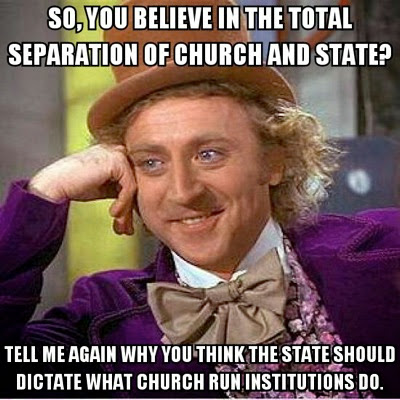A few months ago, people were arguing that a religious freedom was for individuals, not for businesses. Now, definitions have changed again, and a couple who run a marriage chapel according to their religious beliefs are being told to perform same-sex “weddings” or face penalties of 180 days in jail and $1000 in fines for each day they refuse to perform these services. (For refusing to perform one service for one year, that’s 180 years and being fined $365,000 . . . murderers don’t face those penalties).
The argument is that this chapel is not a church but is "considered a place of [public?] accommodation” and therefore subject to the ordinance.
Now a place of accommodation is considered to include:
A public accommodation is a private entity that owns, operates, leases, or leases to, a place of public accommodation. Places of public accommodation include a wide range of entities, such as restaurants, hotels, theaters, doctors' offices, pharmacies, retail stores, museums, libraries, parks, private schools, and day care centers. Private clubs and religious organizations are exempt from the ADA's title III requirements for public accommodations.
So, basically this is assuming that because a wedding chapel, which approaches marriage from a Christian perspective, serves the public, it cannot refuse performing same-sex ceremonies. This is essentially a use of redefining in order to change the meaning of the law to the benefit of one group and the detriment of another group.
That’s the common practice in America today. When it comes to religious freedom, the government practice is to define the law or court ruling in such a way that they can exclude as many as possible from the exercising of these rights if the exercise of religious freedom goes against the preference of the lawmaker or the judge.
Religious freedom belongs to the Bill of Rights as something the individual possesses independently of what the government bestows—the government simply has no right to infringe on them. The First Amendment essentially enables the freedom to do what one feels morally obligated to do. It’s not a laundry list of separate and unrelated rights. It’s a case of of forbidding the government from coercing people to do that which they believe is immoral to do. The amendment reads:
Congress shall make no law respecting an establishment of religion, or prohibiting the free exercise thereof; or abridging the freedom of speech, or of the press; or the right of the people peaceably to assemble, and to petition the Government for a redress of grievances.
So according to this, the State cannot:
- Restrict one’s right of peacefully living in accord with one’s religious beliefs.
- Restrict one’s right to peacefully speak or write to promote what one believes is good and oppose what is evil—openly.
- Restrict one’s right to peacefully assemble with people who share one’s beliefs.
- Restrict one’s right to peacefully change the government through legal means when we believe it is going in the wrong direction.
But the government and groups allied with it have been restricting these rights by trying to limit the influence of religion in the following ways:
- Denying the freedom of religion from applying to all aspects of the life of the person who adheres to it.
- Bullying people from speaking out on what is right.
- Limiting what kind of groups that assemble can practice religious freedom—for example, denying places of businesses can be run according to religious beliefs of the owners.
- Negating laws supported by a majority of citizens on the grounds that it has a “religious motivation.”
These tactics pervert the First Amendment by making the government the judge of which religious values are legitimate concerns, when the whole point of the First Amendment was to prevent the government from behaving in this way. The government being able to restrict whether a person or group may be free to hold to a belief others may dislike is a dangerous one. The Nazi and Communist regimes are obvious examples of a government forbidding anything deemed to be against their interests. But other restrictions by less extreme regimes differ only by degree because the government is still demanding authority over the religion one believes to be right.
Thus the government declares that a university or hospital affiliated with a Church may not refuse to supply coverage of contraception and abortifacient drugs even though the Church believes the use of these things is wrong. It decrees that a wedding chapel, run by Christians according to religious values, may not refuse to officiate over a relationship the owners believe cannot even be a marriage. It says laws passed by a majority of citizens affirming that marriage is a relationship that only can exist between one man and one woman, or laws acknowledging that the unborn child is a human being are not valid because the shared beliefs of the voters is deemed “religious.” (Genetic Fallacy).
The defense currently popular with the government and its allies is to equate these things with historical “discrimination.” For example, laws against contraception and abortion are considered “discriminating” against women. Laws defining marriage as existing only between one man and one woman are labelled as discriminating against people with same sex attraction. The assumption is supposed to be proven, but the fact is people assume it is proof. (Begging the Question Fallacy).
Ultimately, what the government does is to constantly redefine things in order to place something they dislike under the categories of “discrimination,” “establishment clause,” or “equal protection clause” in order to prevent them from being enforced.
What was once recognized as freedom under the First Amendment is now called “discrimination.” This is not because we have become more enlightened (begging the question again), but because it is a convenient way to negate a law the government dislikes without using the legal process to change a law.
Another tactic is the slippery slope fallacy. It is alleged that without the government and the courts overseeing religion, we’re opening the doors for the rise of sharia law or human sacrifice. But that’s asinine. The American concept of the freedom of religion has never recognized the right of a religion to actively harm another person. Nor have the advocates of religious freedom ever advocated such a thing. Catholic bishops condemn abortion—but they also condemn the murder of the abortionist.
Scare tactics like that make no sense. It’s wrong for Person A from Religion B to murder another person, so it’s wrong for person A to oppose contraception and abortion?
If anything, it’s government that is behaving in a coercive way. Imposing support for anti-Christian values against the will of the Christian citizen is merely a bloodless version of something like ISIS is doing in the Middle East. Go along or be targeted—by law or by bullying in our case. I don’t use this image insensitive of the suffering of the Middle East. Rather I am pointing out that, regardless of whether one uses law or terror to impose a position, one is actively forcing believers to do what they believe is wrong (which is quite different from forcing everybody to do what a religion wants). It is a violation of religious freedom
So ultimately, we have to beware the government because the government changes the meaning of words (fallacy of redefining). When it changes the definitions of words and legal terms, such as “religious freedom” and “marriage,” it does so to vilify the opponent or to promote its own agenda. The danger is, when we allow the government to do such things, it can easily change anything it wants. The only defense is to hold it to the true definition every time.






